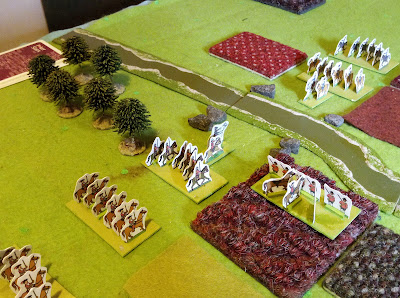Here's the battlefield, with Caesar placing his first unit.
I got most of my Saxons on-table in the first move. I had a core of foot sergeants, with my leader in a group of men at arms, plus some bidowers as skirmishers and a force of Vaguely Viking wild foot.
Caesar's Normans were mostly mounted - two units of mounted men at arms supported by two units of mounted sergeants, plus some archers.
We secretly chose three boasts, and annunced them via heralds before our troops arrived on the table. Both of us vowed that out leader would destroy the opposing leader, and that we'd also destroy the enemy's highest value unit (which in both cases was that of the opposing leader). This was going to make for a very personal fight. Caesar boasted that he would ride rings round my army, meaning he would have a unit closer to my baseline than any of mine. I vowed that I would challenge his leader to a duel. This played to my leader's special ability; I was good in duels.
Caesar set out to achieve his easiest goal, sending sergeants down each flank to get into the rear of my retinue.
His leader hung back. As part of a unit of men at arms he was prone to charging the enemy, and Caesar wanted to keep him out of the action until he'd had a chance to seek out my leader's unit and soften him up a little. His other men at arms piled into my foot sergeant 'fyrd'.
Supported by his lesser horse he made short work of the hapless Saxons, not helped by my failing early activation rolls for a couple of turns.
The bulk of the Saxon foot were swiftly and ruthlessly eliminated by the Norman horse.
Meanwhile the rampaging Norman horse attacked my brave Saxon commander, but were fended off.
My skirmishers slipped into a patch of marsh, and put themselves within charge range of the Norman commander. Against his better judgment the Normans charged, and were caught in a fight where they had no real advantage over a few guys with sticks. Normans died.
The other Normans kept attacking the Saxon leader, who was losing bodyguard, but still fighting.
The Vikings got stuck in, destroying a unit of Norman sergeants.
They fared less well against the other group of sergeants though ...
... but drew the Norman commander out of the marsh, before routing.
The Norman leader was now in range of his Saxon counterpart, and I issued a challenge, thus achieving one of my objectives. Caesar's leader, craven to the last, declined. But his retinue were used to it and passed the ensuing morale tests.
However vows had been made, and Caesar was still intent that his leader would destroy mine, even if he was only willing to do so backed up by a gang of mates. He charged and the leaders met as foes, even if not as honourable gentlemen.
Reader, I killed him. Begging for mercy the Norman commander was dragged from his horse, and introduced, briefly, to the business end of an axe. I had fulfilled both of my remaining boasts - my leader had slain his, and I had destroyed my target unit.
Caesar was well ahead in terms of the scenario conditions, with the Saxons now reduced to their leader and a single bodyguard. But we were into the endgame, where any turn might be the last. Unable to achieve one of his remaining boasts, he set out to achieve the other - destroying my leader's unit. His remaining knights charged ... and failed. At the end of what turned out to be the last turn, my leader stood alone and undefeated!
We totalled up Glory. Caesar had easily won the battle (5 Glory), and had achieved one minor boast (1 Glory). But he lost glory for the two failures (-2 Glory), for a total of 4 Glory. I had achieved all of my boasts for a total of 6 Glory. The Saxons, with a single man remaining, were the winner!
This was a fun game with the Saxons very much on the back foot but able to scrape a victory by judicious use of terrain, keeping an eye on the actual victory conditions, and a seasoning of outrageous fortune.


























































